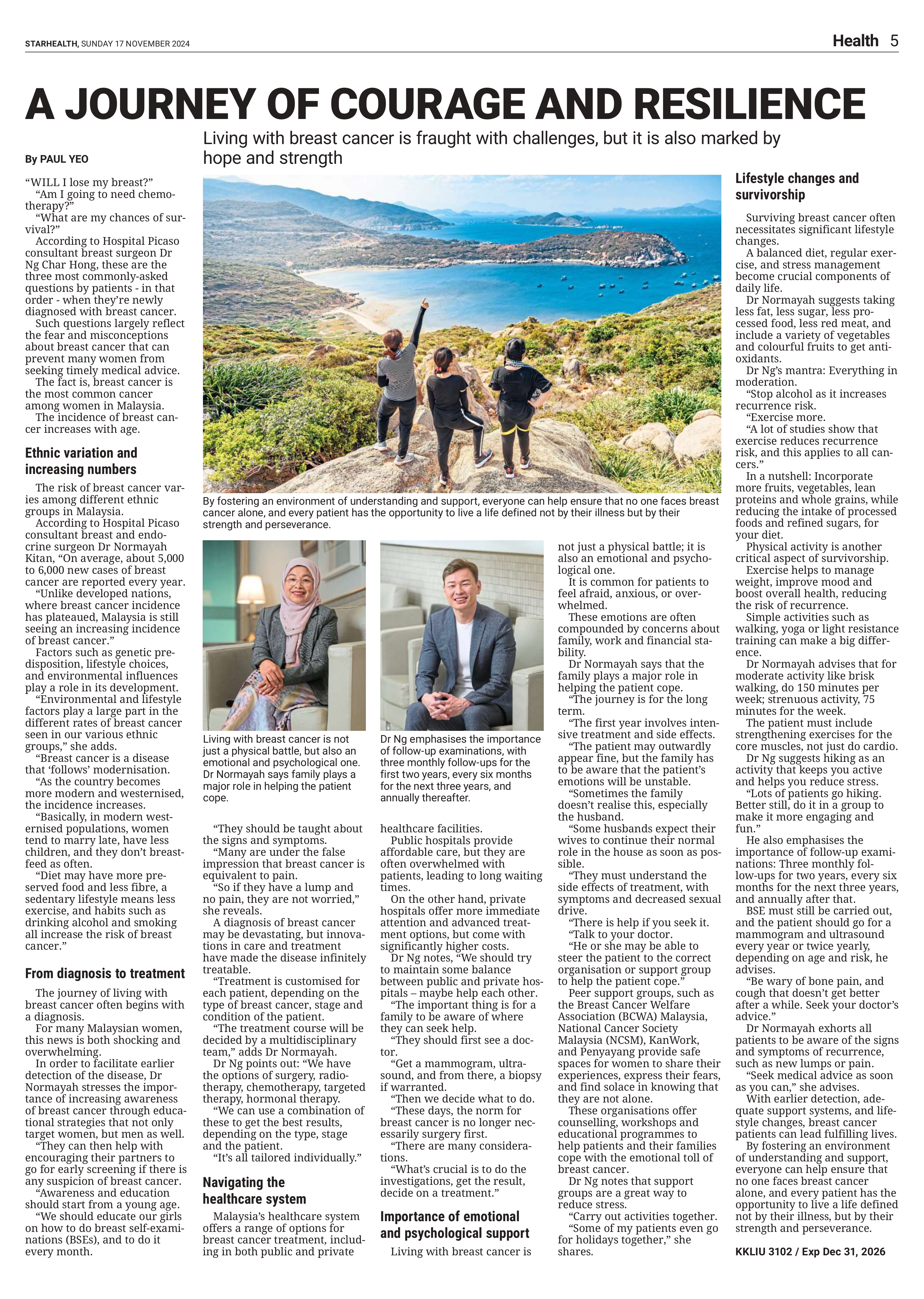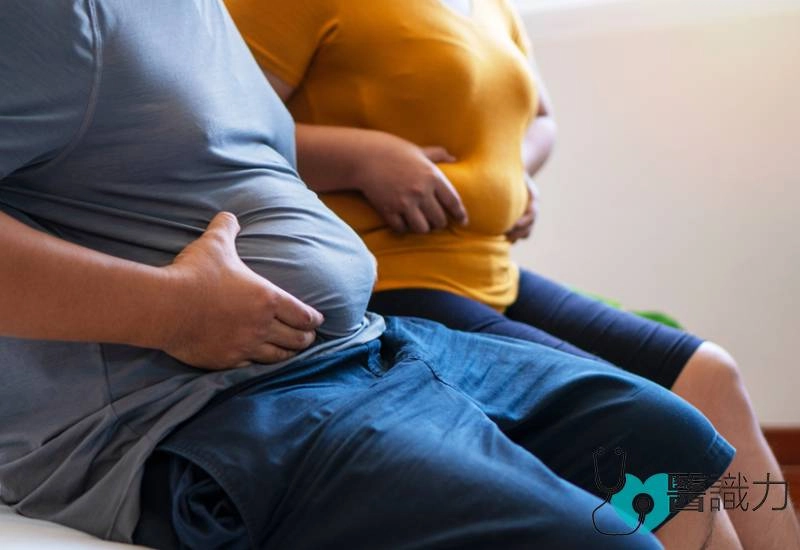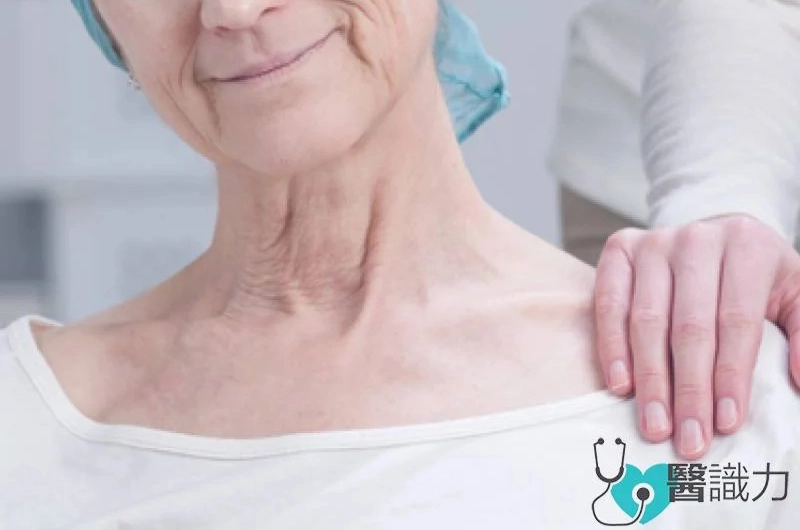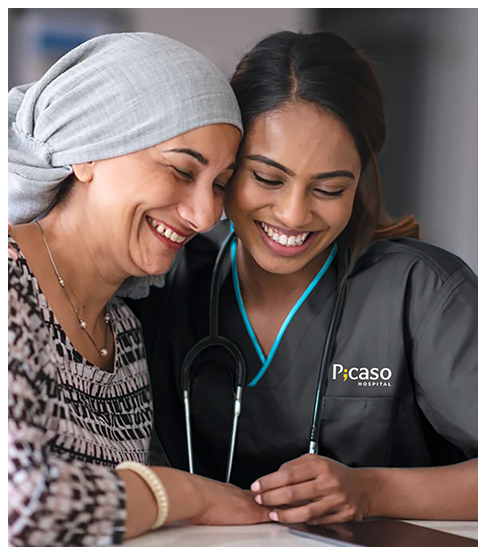A JOURNEY OF COURAGE AND RESILIENCE
November 17, 2024
“WILL I lose my breast?”
“Am I going to need chemotherapy?”
“What are my chances of survival?”
According to Hospital Picaso consultant breast surgeon Dr Ng Char Hong, these are the three most commonly-asked questions by patients - in that order - when they’re newly diagnosed with breast cancer.
Such questions largely reflect the fear and misconceptions about breast cancer that can prevent many women from seeking timely medical advice.
The fact is, breast cancer is the most common cancer among women in Malaysia.
The incidence of breast cancer increases with age.

Living with breast cancer is not just a physical battle, but also an emotional and psychological one. Dr Normayah says family plays a major role in helping the patient cope.
Ethnic variation and increasing numbers
The risk of breast cancer varies among different ethnic groups in Malaysia.
According to Hospital Picaso consultant breast and endocrine surgeon Dr Normayah Kitan, “On average, about 5,000 to 6,000 new cases of breast cancer are reported every year.
“Unlike developed nations, where breast cancer incidence has plateaued, Malaysia is still seeing an increasing incidence of breast cancer.”
Factors such as genetic predisposition, lifestyle choices, and environmental influences play a role in its development.
“Environmental and lifestyle factors play a large part in the different rates of breast cancer seen in our various ethnic groups,” she adds.
“Breast cancer is a disease that ‘follows’ modernisation.
“As the country becomes more modern and westernised, the incidence increases.
“Basically, in modern westernised populations, women tend to marry late, have less children, and they don’t breastfeed as often.
“Diet may have more preserved food and less fibre, a sedentary lifestyle means less exercise, and habits such as drinking alcohol and smoking all increase the risk of breast cancer.”
From diagnosis to treatment
The journey of living with breast cancer often begins with a diagnosis.
For many Malaysian women, this news is both shocking and overwhelming.
In order to facilitate earlier detection of the disease, Dr Normayah stresses the importance of increasing awareness of breast cancer through educational strategies that not only target women, but men as well.
“They can then help with encouraging their partners to go for early screening if there is any suspicion of breast cancer.
“Awareness and education should start from a young age.
“We should educate our girls on how to do breast self-examinations (BSEs), and to do it every month.
“They should be taught about the signs and symptoms.

Dr Ng emphasises the importance of follow-up examinations, with three monthly follow-ups for the first two years, every six months for the next three years, and annually thereafter.
“Many are under the false impression that breast cancer is equivalent to pain.
“So if they have a lump and no pain, they are not worried,” she reveals.
A diagnosis of breast cancer may be devastating, but innovations in care and treatment have made the disease infinitely treatable.
“Treatment is customised for each patient, depending on the type of breast cancer, stage and condition of the patient.
“The treatment course will be decided by a multidisciplinary team,” adds Dr Normayah.
Dr Ng points out: “We have the options of surgery, radiotherapy, chemotherapy, targeted therapy, hormonal therapy.
“We can use a combination of these to get the best results, depending on the type, stage and the patient.
“It’s all tailored individually.”
Navigating the healthcare system
Malaysia’s healthcare system offers a range of options for breast cancer treatment, including in both public and private healthcare facilities.
Public hospitals provide affordable care, but they are often overwhelmed with patients, leading to long waiting times.
On the other hand, private hospitals offer more immediate attention and advanced treatment options, but come with significantly higher costs.
Dr Ng notes, “We should try to maintain some balance between public and private hospitals – maybe help each other.
“The important thing is for a family to be aware of where they can seek help.
“They should first see a doctor.
“Get a mammogram, ultrasound, and from there, a biopsy if warranted.
“Then we decide what to do.
“These days, the norm for breast cancer is no longer necessarily surgery first.
“There are many considerations.
“What’s crucial is to do the investigations, get the result, decide on a treatment.”
Importance of emotional and psychological support
Living with breast cancer is not just a physical battle; it is also an emotional and psychological one.
It is common for patients to feel afraid, anxious, or overwhelmed.
These emotions are often compounded by concerns about family, work and financial stability.
Dr Normayah says that the family plays a major role in helping the patient cope.
“The journey is for the long term.
“The first year involves intensive treatment and side effects.
“The patient may outwardly appear fine, but the family has to be aware that the patient’s emotions will be unstable.
“Sometimes the family doesn’t realise this, especially the husband.
“Some husbands expect their wives to continue their normal role in the house as soon as possible.
“They must understand the side effects of treatment, with symptoms and decreased sexual drive.
“There is help if you seek it.
“Talk to your doctor.
“He or she may be able to steer the patient to the correct organisation or support group to help the patient cope.”
Peer support groups, such as the Breast Cancer Welfare Association (BCWA) Malaysia, National Cancer Society Malaysia (NCSM), KanWork, and Penyayang provide safe spaces for women to share their experiences, express their fears, and find solace in knowing that they are not alone.
These organisations offer counselling, workshops and educational programmes to help patients and their families cope with the emotional toll of breast cancer.
Dr Ng notes that support groups are a great way to reduce stress.
“Carry out activities together.
“Some of my patients even go for holidays together,” she shares.
Lifestyle changes and survivorship
Surviving breast cancer often necessitates significant lifestyle changes.
A balanced diet, regular exercise, and stress management become crucial components of daily life.
Dr Normayah suggests taking less fat, less sugar, less processed food, less red meat, and include a variety of vegetables and colourful fruits to get antioxidants.
Dr Ng’s mantra: Everything in moderation.
“Stop alcohol as it increases recurrence risk.
“Exercise more.
“A lot of studies show that exercise reduces recurrence risk, and this applies to all cancers.”
In a nutshell: Incorporate more fruits, vegetables, lean proteins and whole grains, while reducing the intake of processed foods and refined sugars, for your diet.Physical activity is another critical aspect of survivorship.
Exercise helps to manage weight, improve mood and boost overall health, reducing the risk of recurrence.
Simple activities such as walking, yoga or light resistance training can make a big difference.
Dr Normayah advises that for moderate activity like brisk walking, do 150 minutes per week; strenuous activity, 75 minutes for the week.
The patient must include strengthening exercises for the core muscles, not just do cardio.
Dr Ng suggests hiking as an activity that keeps you active and helps you reduce stress.
“Lots of patients go hiking. Better still, do it in a group to make it more engaging and fun.”
He also emphasises the importance of follow-up examinations: Three monthly follow-ups for two years, every six months for the next three years, and annually after that.
BSE must still be carried out, and the patient should go for a mammogram and ultrasound every year or twice yearly, depending on age and risk, he advises.
“Be wary of bone pain, and cough that doesn’t get better after a while. Seek your doctor’s advice.”
Dr Normayah exhorts all patients to be aware of the signs and symptoms of recurrence, such as new lumps or pain.
“Seek medical advice as soon as you can,” she advises.
With earlier detection, adequate support systems, and lifestyle changes, breast cancer patients can lead fulfilling lives.
By fostering an environment of understanding and support, everyone can help ensure that no one faces breast cancer alone, and every patient has the opportunity to live a life defined not by their illness, but by their strength and perseverance.
KKLIU 3102 / Exp Dec 31, 2026
Reference










